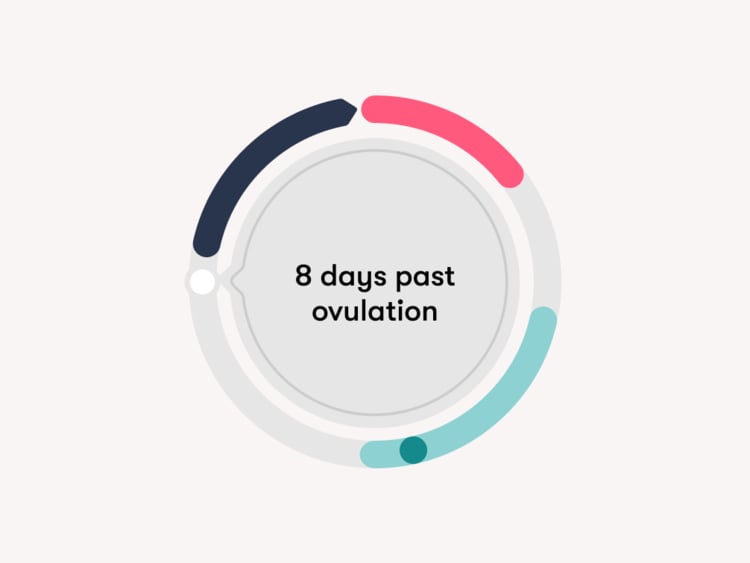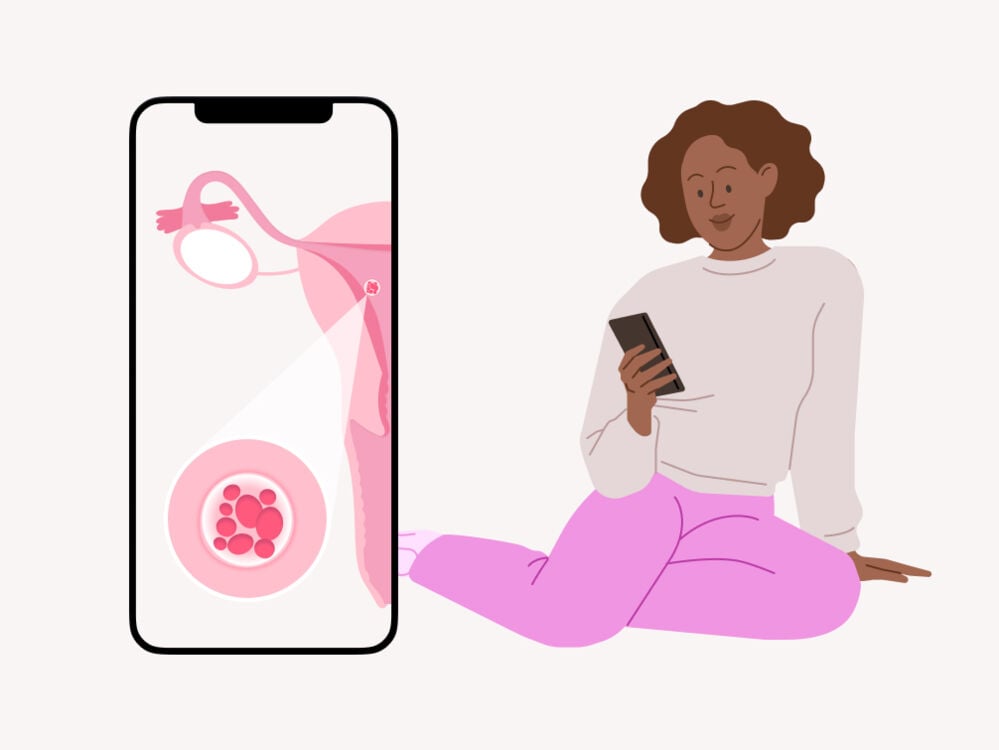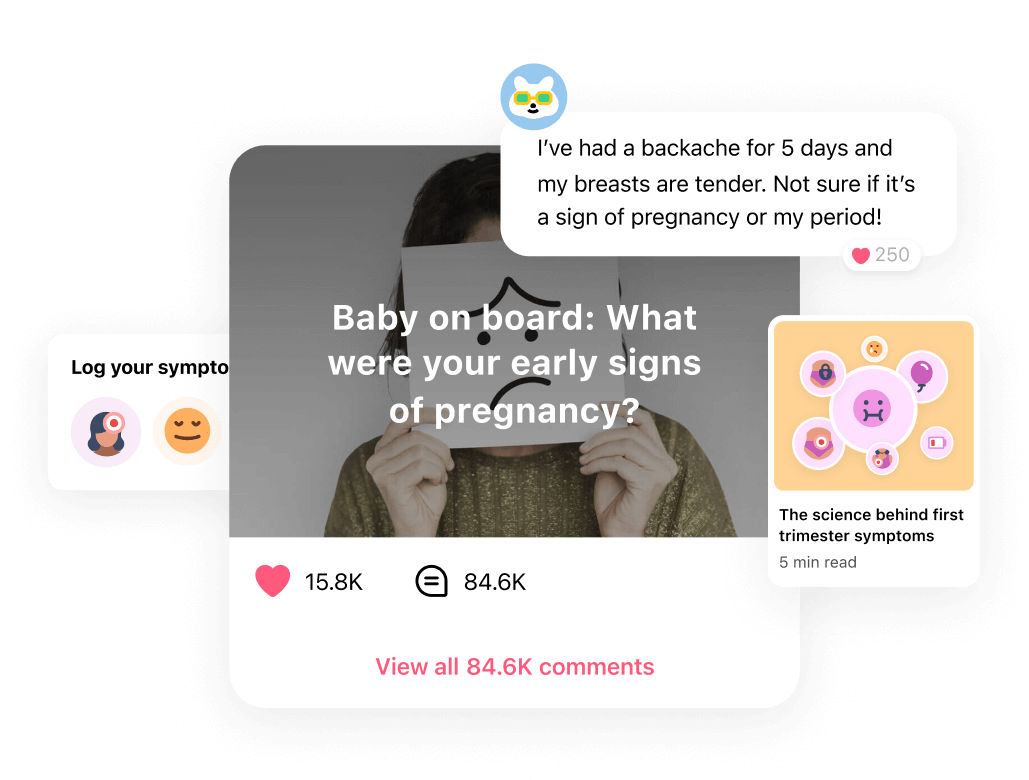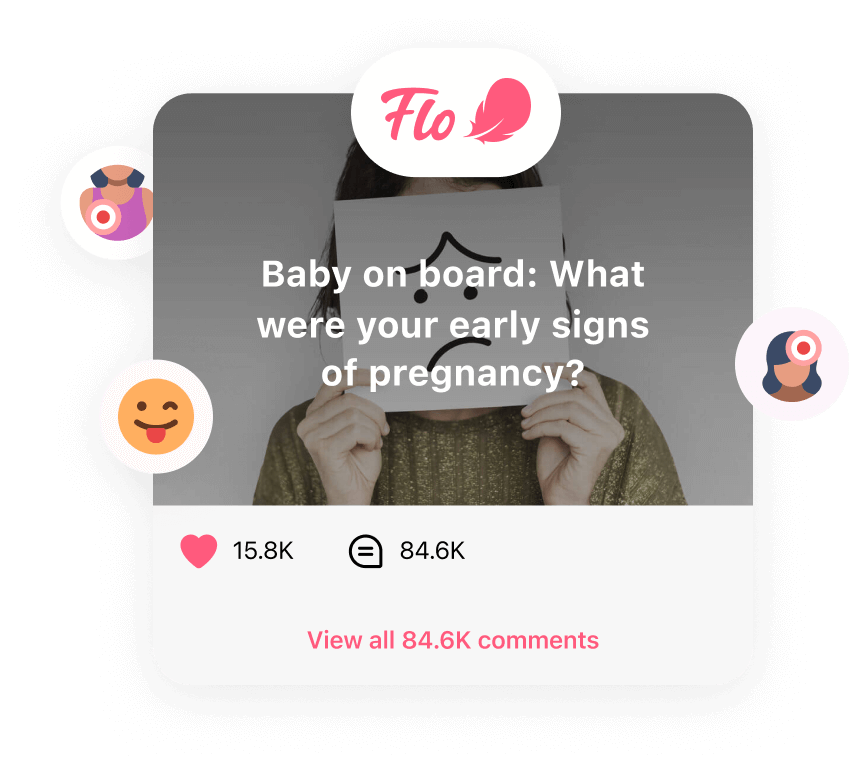At 8 DPO, you’re at an important milestone in your cycle. From potential pregnancy symptoms to hormonal changes, here’s the lowdown on 8 DPO.
-
Tracking cycle
-
Getting pregnant
-
Pregnancy
-
Help Center
-
Flo for Partners
-
Anonymous Mode
-
Flo app reviews
-
Flo Premium New
-
Secret Chats New
-
Symptom Checker New
-
Your cycle
-
Health 360°
-
Getting pregnant
-
Pregnancy
-
Being a mom
-
LGBTQ+
-
Quizzes
-
Ovulation calculator
-
hCG calculator
-
Pregnancy test calculator
-
Menstrual cycle calculator
-
Period calculator
-
Implantation calculator
-
Pregnancy weeks to months calculator
-
Pregnancy due date calculator
-
IVF and FET due date calculator
-
Due date calculator by ultrasound
-
Medical Affairs
-
Science & Research
-
Pass It On Project New
-
Privacy Portal
-
Press Center
-
Flo Accuracy
-
Careers
-
Contact Us
8 DPO: Are there any pregnancy symptoms at 8 days past ovulation?


Every piece of content at Flo Health adheres to the highest editorial standards for language, style, and medical accuracy. To learn what we do to deliver the best health and lifestyle insights to you, check out our content review principles.
Trying for a baby can be exciting, nerve-racking, and overwhelming all at once. While it’s fun to plan for the future, waiting to find out if you’re pregnant or not every month can also be tricky to navigate. And at eight days past ovulation (DPO), your period isn’t due for another week, so you might find yourself focusing on every little twinge in the hope of spotting a pregnancy clue.
But is it possible to experience early signs of pregnancy at 8 DPO, or do you really have to wait for a missed period to find out for sure?
The truth is that while some people report symptoms at this stage, 8 DPO is generally too early to tell if you are pregnant. That said, 8 DPO is still an important milestone in your cycle. While you might not feel any different, implantation — when your fertilized egg attaches to your uterine lining — usually happens at around this time, signaling the official start of pregnancy.
Let’s take a closer look at what to expect at 8 DPO, plus the best time to take a pregnancy test.
8 DPO symptoms if you’re pregnant
You might have heard of the luteal phase described as the “two-week wait” (TWW) because — when you’re trying to conceive — that tricky time between ovulation and when your period usually starts can feel like an eternity. And it doesn’t help that early pregnancy symptoms often mirror how you might feel in the week leading up to your period. These symptoms are sometimes described as premenstrual syndrome, or PMS for short.
Take a quiz
Find out what you can do with our Health Assistant
We now know that 8 DPO is still too early to take a pregnancy test. However, hormonal changes that take place both during early pregnancy and just before your period starts can trigger a number of changes in your body. These can include:
- Cramps
- Spotting
- Nausea
- Breast pain or tenderness
- Headaches
- Mood swings
- Fatigue or feeling more tired than normal
Let’s dig into these symptoms more.
Cramping
If you experience period-like cramping at 8 DPO, this could be due to implantation, when your newly formed embryo attaches itself to your uterine lining. It’s really important to note that there’s little scientific evidence to suggest that cramping is a sign of implantation. However, some people say they feel it. This causes the uterus to contract, resulting in back pain and cramping.
Spotting
Bleeding can be alarming when you’re trying to conceive, but if you experience light spotting at around 8 DPO, then try not to worry. Implantation bleeding is a fairly common early pregnancy symptom. Many women mistake it for a period, but spotting often happens during implantation as a result of your fertilized egg embedding itself in your uterine lining.
Nausea
Nausea is a well-known early sign of pregnancy, although pregnancy or morning sickness doesn’t usually kick in for a few more weeks. If you also experience constipation symptoms or indigestion at 8 DPO, this could be linked to a surge in your hormones.
Breast pain
Again, changing hormone levels following implantation can make your breasts feel extra sore around 8 DPO. Breast pain is a common early sign of pregnancy, as your breasts grow and become more sensitive while they prepare for milk production.

Headaches
Thanks to those pesky hormones, it’s normal to experience migraines and tension headaches during the early stages of pregnancy, too. Headaches won’t harm your baby during pregnancy, but they can be uncomfortable, so try to drink plenty of water and get all of the rest you need.
Mood swings
If you are struggling with mood swings at 8 DPO that make you feel irritable and stressed out, you might assume it means your period is on the way. While changes in mood are a classic premenstrual symptom, thanks to hormonal fluctuations, they are also pretty common during early pregnancy, too.
Fatigue
Can’t keep your eyes open? Rising progesterone levels often contribute to exhaustion and fatigue in early pregnancy, so it’s normal to feel tired in the second half of the luteal phase.
8 DPO: What is happening to your body?
At 8 DPO, you’re in the luteal phase of your cycle. If you’re reading this and thinking, “What is the luteal phase?” then here’s a quick biology lesson for you.
Your menstrual cycle can be split into two stages:
- The follicular phase: A new menstrual cycle starts on the first day of your period. This first stage of your cycle is called your follicular phase. If your cycle lasts around 28 days, then your follicular phase usually spans from days one to 14. During this time, your estrogen levels rise, and the lining of your uterus thickens in preparation for a fertilized egg to implant.
- The luteal phase: Between days 14 and the end of your cycle, you enter the luteal phase. This starts when one of your ovaries releases an egg, known as ovulation. Following this, your progesterone levels rise, and if your egg was fertilized by a sperm, then it may implant into the wall of your uterus, and you may become pregnant.
So if you’re 8 DPO, this means you’re about halfway through the luteal phase, and your body is busy preparing for a potential pregnancy.
Provided your egg has been fertilized by sperm, it’s now in the process of traveling down your uterine tubes and implanting itself into your uterine lining. If implantation does take place, your placenta then begins to form. This is a whole new organ that develops in pregnancy, and it starts to release human chorionic gonadotropin (hCG) — the pregnancy hormone that at-home pregnancy tests look for in your pee to find out if you’re pregnant or not.
8 DPO discharge: What’s normal?
As your hormones fluctuate throughout your cycle, your discharge also changes. Around ovulation, your discharge might look and feel clear and slippery, a little bit like raw egg whites. After you’ve ovulated (8 DPO), your discharge may be white, dry, or sticky. However, we’re all different, and discharge after ovulation can vary from person to person.
If you want to keep an eye on changes in your vaginal discharge and better understand your body’s baseline and patterns, it can help to log them in a period-tracking app like Flo.

 Over
7.8M
ratings averaging
4.8/5
*
Over
7.8M
ratings averaging
4.8/5
*
Understand your body’s signals with the Flo app
- Chat with others who are trying to get pregnant.
- Get trusted information on signs of pregnancy from 100+ medical experts.
- Log your symptoms and learn what they could be trying to tell you.
 Over
7.8M
ratings averaging
4.8/5
*
Over
7.8M
ratings averaging
4.8/5
*

Trying to conceive?
The Flo app can help you through the two-week wait.

 Over
7.8M
ratings averaging
4.8/5
*
Over
7.8M
ratings averaging
4.8/5
*
Understand your body’s signals with the Flo app
- Chat with others who are trying to get pregnant.
- Get trusted information on signs of pregnancy from 100+ medical experts.
- Log your symptoms and learn what they could be trying to tell you.
Can I take a pregnancy test at 8 DPO, or is it too early?
Thinking you’re pregnant but not being entirely sure can be stressful, so it’s not surprising that you want to take a pregnancy test as early as you can. But, the truth is that 8 DPO is generally too early because, as Dr. Renita White, obstetrician and gynecologist, Georgia Obstetrics and Gynecology, Georgia, US explains, “The pregnancy hormones are not high enough yet to be secreted into your urine, so often a urine pregnancy test is not positive yet.” For an accurate result, the best time to take an at-home urinary pregnancy test is the first day of your missed period.
That said, understanding the signs and symptoms of early pregnancy and knowing what happens during this stage of your menstrual cycle can help you feel more prepared, so let’s find out more.
Are 8 DPO symptoms a sign of a BFP?
If you’ve been trying to conceive, then you may have already heard the acronym BFP or “big fat positive.” The fertility space really is full of acronyms.
Fear not if you’ve never heard of a BFP. It’s simply a positive pregnancy test result. As we’ve already said, it’s still a little early to do a pregnancy test at 8 DPO, and symptoms around this time could simply mean your period is on the way. For the most accurate results, it’s best to wait until the first day of a missed period.
8 DPO and no symptoms
If you’re 8 DPO and you don’t feel any different, try not to worry. “Some people don’t have pregnancy symptoms by 8 DPO because the hormone levels are not high enough in the bloodstream yet,” says Dr. White. And if you are pregnant, annoyingly, there isn’t a fixed timeline for when you’ll feel it. Everyone experiences pregnancy differently. Aside from missing your period, you might not have any symptoms for several weeks, while others might have been able to tell much earlier.
Trying to conceive can be an emotional time, so try to be kind to yourself. Doing little things to take your mind off of it and putting in place strategies to regularly take your mind off things over the two-week wait can help. You could try starting a new book or box set, committing to a daily exercise or mindfulness practice, or simply calling a friend each time your mind wanders to it.
Key takeaways
- Implantation (the fertilized egg attaching to your uterine lining) usually happens around now if you’re pregnant.
- You might start to notice early pregnancy signs, but you still need to wait until 14 DPO (the first day of your missed period) to take a pregnancy test for an accurate result.
- Pregnancy tests work by detecting the hormone hCG, which your body starts to produce following implantation. But if you test too soon, you risk getting a false negative because there might not be enough hCG in your pee to register on a home test.
More FAQs
Can you implant 8 days after ovulation?
Research shows that implantation is most likely to happen between six and 10 DPO, so it is possible to implant eight days after ovulation.
What does 8 DPO cramping feel like?
Everyone experiences pregnancy slightly differently. While there’s little scientific evidence to suggest that cramping is a sign of implantation, some people say they feel it. You might feel a slight twinge in your lower abdomen, cramping in your back for several days, or it might feel similar to period pain.
Does a positive at 8 DPO mean twins?
It can be really tempting to take a pregnancy test before you’ve missed a period. However, 8 DPO is still too early for an accurate home pregnancy test result, so it’s best to wait.
Is 8 DPO too early for a BFP?
While a faint line on a pregnancy test is not impossible, 8 DPO is generally too early for a big fat positive (BFP). For an accurate result, the best time to take a pregnancy test is the first day of your missed period.
Can a blood test detect pregnancy at 8 DPO?
Blood tests for pregnancy are slightly more sensitive than urine tests because they can detect very small levels of hCG very early on in pregnancy, sometimes within seven to 10 DPO. That said, it could still provide a false-negative result if you take the test before implantation has occurred. Speak to your doctor for more information.


Hey, I'm Anique
I started using Flo app to track my period and ovulation because we wanted to have a baby.


The Flo app helped me learn about my body and spot ovulation signs during our conception journey.


I vividly
remember the day
that we switched
Flo into
Pregnancy Mode — it was
such a special
moment.
Real stories, real results
Learn how the Flo app became an amazing cheerleader for us on our conception journey.
References
“1st Trimester Pregnancy: What to Expect.” Mayo Clinic, 27 Feb. 2024, www.mayoclinic.org/healthy-lifestyle/pregnancy-week-by-week/in-depth/pregnancy/art-20047208.
“Week 4.” NHS, www.nhs.uk/start-for-life/pregnancy/week-by-week-guide-to-pregnancy/1st-trimester/week-4/. Accessed 26 Mar. 2025.
“Am I Pregnant?” Cleveland Clinic, my.clevelandclinic.org/health/articles/9709-pregnancy-am-i-pregnant. Accessed 26 Mar. 2025.
“Conception.” Cleveland Clinic, my.clevelandclinic.org/health/articles/11585-conception. Accessed 26 Mar. 2025.
“Doing a Pregnancy Test.” NHS, www.nhs.uk/pregnancy/trying-for-a-baby/doing-a-pregnancy-test/. Accessed 26 Mar. 2025.
“Follicular Phase.” Cleveland Clinic, my.clevelandclinic.org/health/body/23953-follicular-phase. Accessed 26 Mar. 2025.
Gudipally, Pratyusha R., and Gyanendra K. Sharma. “Premenstrual Syndrome.” StatPearls, StatPearls Publishing, 17 July 2023, https://www.ncbi.nlm.nih.gov/books/NBK560698/.
“Headaches in Pregnancy.” NHS, www.nhs.uk/pregnancy/related-conditions/common-symptoms/headaches/. Accessed 26 Mar. 2025.
“Home Pregnancy Tests: Can You Trust the Results?” Mayo Clinic, 23 Dec. 2022, www.mayoclinic.org/healthy-lifestyle/getting-pregnant/in-depth/home-pregnancy-tests/art-20047940.
“Is Implantation Bleeding Common in Early Pregnancy?” Mayo Clinic, 19 Apr. 2022, www.mayoclinic.org/healthy-lifestyle/pregnancy-week-by-week/expert-answers/implantation-bleeding/faq-20058257.
Kim, Su-Mi, and Jong-Soo Kim. “A Review of Mechanisms of Implantation.” Development and Reproduction, vol. 21, no. 4, 31 Dec. 2017, pp. 351–59, doi:10.12717/DR.2017.21.4.351.
“Luteal Phase.” Cleveland Clinic, my.clevelandclinic.org/health/articles/24417-luteal-phase. Accessed 26 Mar. 2025.
Negro, A., et al. “Headache and Pregnancy: A Systematic Review.” The Journal of Headache and Pain, vol. 18, no. 1, 19 Oct. 2017, doi:10.1186/s10194-017-0816-0.
“Pregnancy Tests.” Cleveland Clinic, my.clevelandclinic.org/health/diagnostics/9703-pregnancy-tests. Accessed 26 Mar. 2025.
Thiyagarajan, Dhanalakshmi K., et al. “Physiology, Menstrual Cycle.” StatPearls, StatPearls Publishing, 27 Sep. 2024, www.ncbi.nlm.nih.gov/books/NBK500020/.
“Tiredness and Sleep Problems.” NHS, www.nhs.uk/pregnancy/related-conditions/common-symptoms/tiredness/. Accessed 26 Mar. 2025.
“You and Your Pregnancy at 1 to 3 Weeks.” NHS, www.nhs.uk/pregnancy/week-by-week/1-to-12/1-2-3-weeks/. Accessed 26 Mar. 2025.
“What Are Some Common Signs of Pregnancy?” Eunice Kennedy Shriver National Institute for Child Health and Human Development, www.nichd.nih.gov/health/topics/pregnancy/conditioninfo/signs. Accessed 25 Mar. 2025.
Wilcox, A. J., et al. “Time of Implantation of the Conceptus and Loss of Pregnancy.” The New England Journal of Medicine, vol. 340, no. 23, 10 June 1999, pp. 1796–99, doi:10.1056/NEJM199906103402304.
Zou, Yuliang, et al. “Hormonal Changes and Somatopsychologic Manifestations in the First Trimester of Pregnancy and Post Partum.” International Journal of Gynaecology and Obstetrics, vol. 105, no. 1, Apr. 2009, pp. 46–49, doi:10.1016/j.ijgo.2008.12.001.
History of updates
Current version (14 April 2025)
Published (23 November 2018)
In this article

Get your personal guide to fertility
-
Learn how to read your body's ovulation signals
-
Find daily conception tips from our experts
-
Chat with others who are trying to get pregnant




